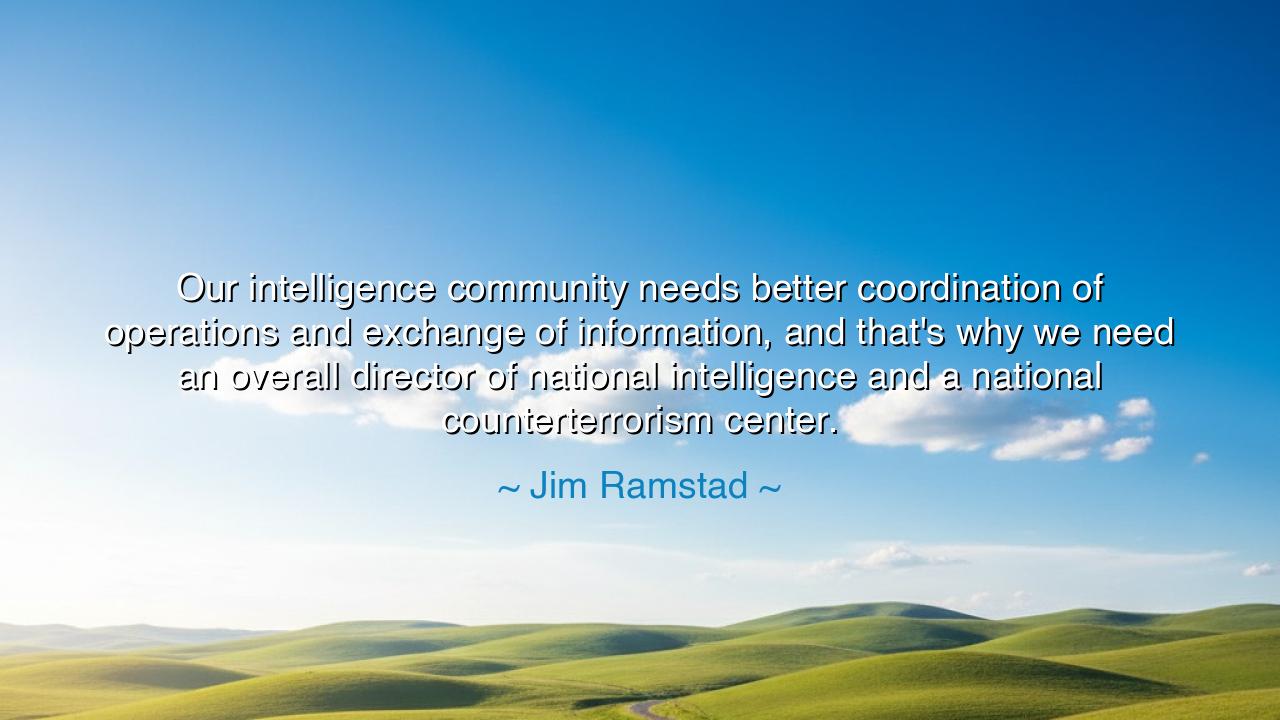
Our intelligence community needs better coordination of
Our intelligence community needs better coordination of operations and exchange of information, and that's why we need an overall director of national intelligence and a national counterterrorism center.






“Our intelligence community needs better coordination of operations and exchange of information, and that's why we need an overall director of national intelligence and a national counterterrorism center.” Thus spoke Jim Ramstad, an American lawmaker whose words arose from the shadow of one of the most tumultuous eras in modern history. His declaration, though rooted in the politics of his time, carries a wisdom that transcends the moment — for it speaks to the eternal truth that knowledge without unity is weakness, and that the strength of a nation, like that of the human spirit, lies in its ability to bring all its parts into harmony of purpose.
Ramstad’s words were born from the aftermath of the September 11, 2001 attacks, when the American people witnessed the devastating cost of fragmentation within their own guardians of security. The intelligence agencies — each powerful, each noble in intent — had gathered fragments of the truth, yet none could see the whole. The FBI, CIA, and NSA all possessed shards of warning, but their walls of secrecy and rivalry prevented the pieces from uniting. Thus, the catastrophe came not from ignorance, but from disconnection — the silence between voices that should have spoken together. In this tragedy, Ramstad and others saw the need for a Director of National Intelligence, one who could weave together the threads of scattered knowledge into a single fabric of understanding.
In his vision, the National Counterterrorism Center would stand as the heart of this coordination — a place where intelligence could flow freely between agencies, where analysts could turn confusion into clarity, and where leaders could act not in isolation but in unity. Ramstad’s words, then, were not merely about bureaucratic reform; they were a call to integration, to the recognition that strength lies not in the number of our efforts, but in the alignment of them. He spoke as one who understood that when many minds work without communication, they become as blind giants — powerful yet clumsy, unable to grasp the subtlety of danger or the precision of response.
The ancients knew this truth well. In the wars of ancient Greece, the city-states often stood divided — each proud, each armed, each unwilling to yield authority to another. When the Persian Empire came with its vast armies, it found Greece fractured, its brilliance scattered. Only when the Greeks united under a common cause — when Athens and Sparta, long rivals, chose coordination over pride — did they achieve victory at Salamis and Plataea. Their triumph was not in their numbers, but in their newfound unity of command and purpose. Ramstad’s call for a single director of intelligence echoes this ancient lesson: that survival depends not on the might of individuals, but on the wisdom of organization and cooperation.
Yet his words hold meaning beyond the realm of governments. They speak, too, to the inner life of every human being. For within each of us lies our own intelligence community — our thoughts, emotions, instincts, and memories, each gathering information from the world, yet often working in disarray. When we are divided within ourselves, we falter; when our mind and heart fail to communicate, we stumble into confusion. Thus, Ramstad’s message can be read as an allegory: to achieve greatness, whether as a nation or as a person, one must align the inner forces of perception, wisdom, and action. Coordination is not only a political virtue — it is a spiritual one.
Moreover, his appeal for exchange of information reminds us of the sacred duty of communication — between individuals, between communities, between nations. Misunderstanding breeds fear, and fear breeds destruction. But when people share knowledge with honesty and humility, when they trust each other enough to break down walls, then ignorance loses its power. In this way, the coordination of intelligence becomes a symbol of the coordination of humanity itself — a reminder that our destinies are bound together, that isolation is an illusion, and that only through cooperation can we overcome the terrors that divide us.
Therefore, O listener, take this wisdom to heart: do not let the fragments of your knowledge remain scattered. In your work, in your relationships, in your nation, seek always to unify the pieces — to bring clarity where there is confusion, to build bridges where there are barriers. Do not fear structure or discipline, for true coordination is not tyranny, but harmony. Just as a choir needs a conductor to transform sound into song, so too do nations and souls need a guiding intelligence to transform information into understanding.
In the end, Jim Ramstad’s words remind us that the greatest failures of history are born not of ignorance, but of disunity — and that the future will belong to those who learn to think and act as one. Whether you guard a nation or guard your own conscience, remember this: knowledge divided is peril, but knowledge shared is power. Let your life, then, become a model of coordination — where thought, purpose, and compassion move together as one. For in unity, as in intelligence, lies the strength that endures through every storm.






AAdministratorAdministrator
Welcome, honored guests. Please leave a comment, we will respond soon